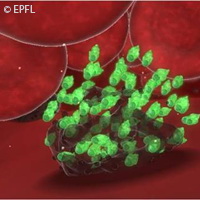Cancer drugs kill malaria-causing parasite
EU-funded researchers have discovered that a class of chemotherapy drugs originally designed to inhibit key signaling pathways in cancer cells also kills the parasite that causes malaria. They believe this discovery could quickly open up a new strategy for combating this deadly disease, which infects 250 million and kills between one and three million people worldwide every year. Efforts to find a treatment have so far been marred by the parasite's ability to quickly develop drug resistance. The research was published online in the journal Cellular Microbiology. Scientists working in France and Switzerland showed that the malaria parasite depends upon a signaling pathway present in the host - initially in liver cells, and then in red blood cells - in order to proliferate. The enzymes active in the signaling pathway are not encoded by the parasite, but rather hijacked by the parasite to serve its own purposes. These same pathways are targeted by a new class of molecules developed for cancer chemotherapy known as kinase inhibitors. When the research team treated red blood cells infected with malaria with the chemotherapy drug, the parasite was stopped in its tracks. The scientists tested red blood cells infected with Plasmodium falciparum parasites and showed that the specific PAK-MEK signaling pathway was more highly activated in infected cells than in uninfected cells. When they disabled the pathway pharmacologically, the parasite was unable to proliferate and died. Applied in vitro, the chemotherapy drug also killed a rodent version of malaria (P. berghei), in both liver cells and red blood cells. According to the researchers, this indicates that hijacking the host cell's signaling pathway is a generalized strategy used by malaria, and thus disabling that pathway would likely be an effective strategy in combating the many strains of the parasite known to infect humans. Until now the parasite has managed to avoid control by quickly developing drug resistance through a selection of mutations. Once in the body, it hides from the immune system inside liver and blood cells, where it proliferates. The discovery that the parasite hijacks a signaling pathway in the host cell opens up a whole new strategy for fighting the disease, said the scientists. 'Instead of targeting the parasite itself, we could make the host cell environment useless to it, thus putting an end to the deadly cycle,' they noted. 'Because this strategy uniquely targets host cell enzymes, the parasite will be deprived of a major modus operandi for development of drug resistance - namely a selection of mutations in the drug target'. Several kinase-inhibiting chemotherapy drugs are already used clinically, and many more have passed stage one and stage two clinical trials. Even though these drugs have toxic effects, they are still being used or considered for use over extended periods for cancer treatment, said the scientists. They said that using them to combat malaria would involve a much shorter treatment period, making the problem of toxicity less acute. They suggested evaluating immediately these drugs for antimalarial properties, thereby drastically reducing the time and cost required to put this new malaria-fighting strategy into practice. The study was funded in part by four EU projects: ANTIMAL ('Development of new drugs for the treatment of malaria); BIOMALPAR ('Biology and pathology of the malaria parasite'); MALSIG ('Signalling in life cycle stages of malaria parasites'); and EVIMALAR ('Towards the establishment of a permanent European virtual institute dedicated to malaria research'). Both ANTIMAL and BIOMALPAR were funded under the 'Life sciences, genomics and biotechnology for health' Thematic area of the EU's Sixth Framework Programme (FP6) to the tune of EUR 17.75 million and EUR 16 million respectively. Supported under the Seventh Framework Programme (FP7), MALSIG and EVIMALAR have each received EUR 3 million and EUR 12 million in funding.For more information, please visit: Ecole Polytechnique Federale de Lausanne (EPFL):http://www.epfl.ch/Cellular Microbiology:http://www.wiley.com/bw/journal.asp?ref=1462-5814
Countries
Switzerland, France



